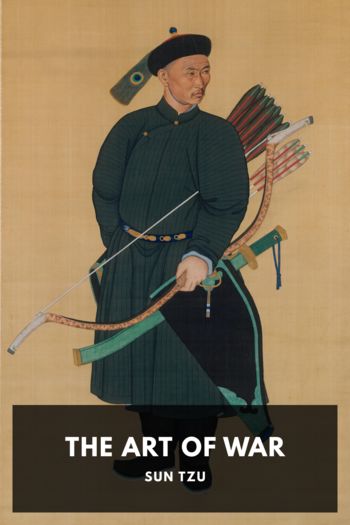The Art of War, Sun Tzu [best english books to read for beginners TXT] 📗

- Author: Sun Tzu
Book online «The Art of War, Sun Tzu [best english books to read for beginners TXT] 📗». Author Sun Tzu
Considering the high popular estimation in which 諸葛亮 Chu-ko Liang has always been held, it is not surprising to find more than one work on war ascribed to his pen. Such are (1) the 十六策 Shih Liu Tsʽê (1 chüan), preserved in the 永樂大典 Yung Lo Ta Tien; (2) 將苑 Chiang Yüan (1 chüan); and (3) 心書 Hsin Shu (1 chüan), which steals wholesale from Sun Tzǔ. None of these has the slightest claim to be considered genuine.
Most of the large Chinese encyclopedias contain extensive sections devoted to the literature of war. The following references may be found useful:—
通典 Tʽung Tien (circa 800 AD), ch. 148–162
太平御覧 Tʽai Pʽing Yu Lan (983), ch. 270–35.
文獻通考 Wen Hsien Tung Kʽao (13th cent.), ch. 221.
玉海 Yu Hai (13th cent.), ch. 140, 141.
三才圖會 San Tsʽai Tʽu Hui (16th cent), 人事 ch. 7, 8.
廣博物志 Kuang Po Wu Chih (1607), ch. 31, 32.
潛確類書 Chʽien Chʽüeh Lei Shu (1632), ch. 75.
淵鑑類函 Yüan Chien Lei Han (1710), ch. 206–229
古今圖書集成 Ku Chin Tʽu Shu Chi Chʽeng (1726), section XXX, esp. ch. 81–90
續文獻通考 Hsu Wen Hsien Tʽung Kʽao (1784), ch. 121–134
皇朝經世文編 Huang Chʽao Ching Shih Wen Pien (1826), ch. 76, 77.
The bibliographical sections of certain historical works also deserve mention:—
前漢書 Chʽien Han Shu, ch. 30.
隋書 Sui Shu, ch. 32–35
舊唐書 Chiu Tʽang Shu, ch. 46, 47.
新唐書 Hsin Tʽang Shu, ch. 57,60.
宋史 Sung Shih, ch. 202–209
通志 Tʽung Chih (circa 1150), ch. 68.
To these of course must be added the great Catalogue of the Imperial Library:—
四庫全書總目提要 Ssǔ Kʽu Chʽüan Shu Tsung Mu Tʽi Yao (1790), ch. 99, 100.
The Art of War I Laying Plans168Sun Tzǔ said: The art of war is of vital importance to the State.
It is a matter of life and death, a road either to safety or to ruin. Hence it is a subject of inquiry which can on no account be neglected.
The art of war, then, is governed by five constant factors, to be taken into account in one’s deliberations, when seeking to determine the conditions obtaining in the field.169
These are: (1) The Moral Law; (2) Heaven; (3) Earth; (4) The Commander; (5) Method and discipline.170
The Moral Law causes the people to be in complete accord with their ruler, so that they will follow him regardless of their lives, undismayed by any danger.171
Heaven signifies night and day, cold and heat, times and seasons.172
Earth comprises distances, great and small; danger and security; open ground and narrow passes; the chances of life and death.173
The Commander stands for the virtues of wisdom, sincerity, benevolence, courage and strictness.174
By Method and discipline are to be understood the marshaling of the army in its proper subdivisions, the graduations of rank among the officers, the maintenance of roads by which supplies may reach the army, and the control of military expenditure.175
These five heads should be familiar to every general: he who knows them will be victorious; he who knows them not will fail.
Therefore, in your deliberations, when seeking to determine the military conditions, let them be made the basis of a comparison, in this wise:—176
Which of the two sovereigns is imbued with the Moral law?177
Which of the two generals has most ability?
With whom lie the advantages derived from Heaven and Earth?178
On which side is discipline most rigorously enforced?179
Which army is stronger?180
On which side are officers and men more highly trained?181
In which army is there the greater constancy both in reward and punishment?182
By means of these seven considerations I can forecast victory or defeat.
The general that hearkens to my counsel and acts upon it, will conquer:—let such a one be retained in command! The general that hearkens not to my counsel nor acts upon it, will suffer defeat:—let such a one be dismissed!183
While heeding the profit of my counsel, avail yourself also of any helpful circumstances over and beyond the ordinary rules.184
According as circumstances are favourable, one should modify one’s plans.185
All warfare is based on deception.186
Hence, when able to attack, we must seem unable; when using our forces, we must seem inactive; when we are near, we must make the enemy believe we are far away; when far away, we must make him believe we are near.
Hold out baits to entice





Comments (0)